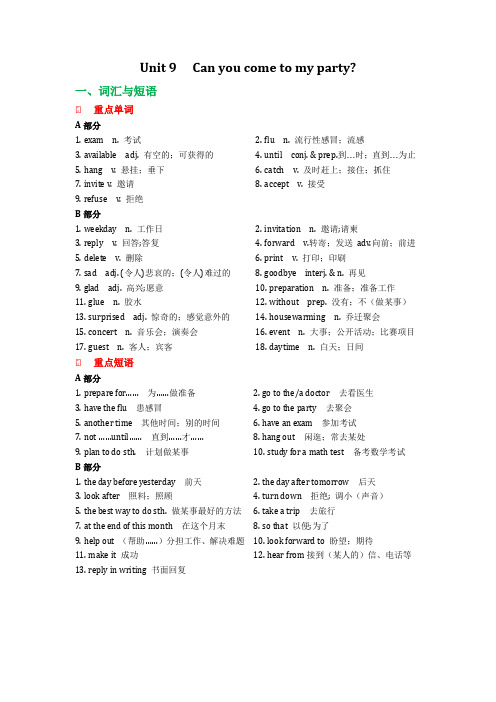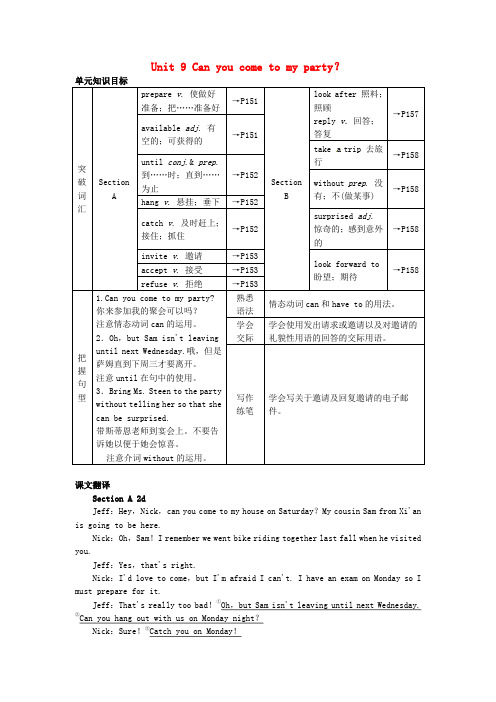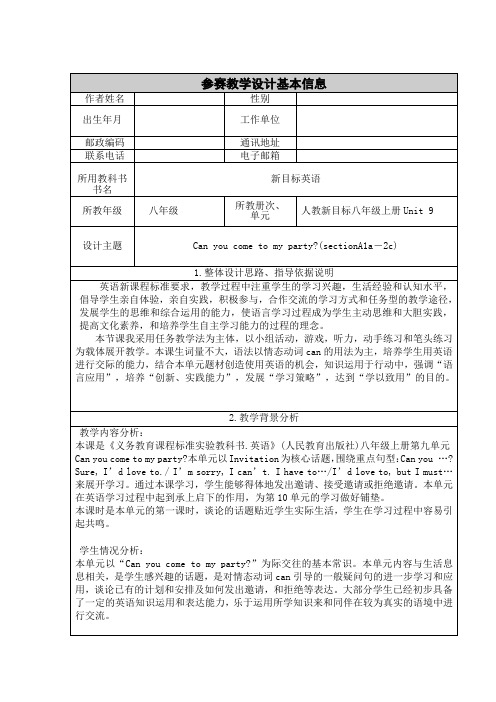人教版八年级英语上册-unit-9-Can-you-come-to-my-party--教学设计(Period-1)
人教版英语八年级上册unit9canyoucometomyparty单元语法

人教版英语八年级上册unit9canyoucometomyparty单元语法单元语法小专题(Grammar Focus)语法精讲情态动词can的用法1.can是情态动词,没有人称和数的变化,但有时态的变化,它的过去式为could,其后可直接接动词原形,其用法如下:(1)表示能力,意为“能,会”。
如:Can you swim?你会游泳吗?Can you answer the question?你能回答这个问题吗?(2)表示许可,意为“可以”,相当于may(比may更口语化,may较正式)。
此外,could也可以表示许可,语气更加委婉。
如:Can/May I come in?我可以进来吗?Can you help me?你能帮我吗?You may go home now.你现在可以回家了。
Could you help me find it?你能帮我找到它吗?(3)用于提出邀请。
对其作肯定回答通常用“Sure./Of course./Certainly./Yes,I'd love to.”等,作否定回答通常用“Sorry/No,I can't.”等。
如:—Can he come to my party?他能来参加我的派对吗?—Yes.He'd love to.是的。
他很乐意。
—Can you go to the baseball game?你能去看棒球比赛吗?—Sorry,I can't.对不起,我不能。
(4)用于否定句或疑问句中,表示推测。
如:Mr.Wang can't be at home.王老师不可能在家里。
2.can的句式变化(1)在变否定句时,直接在后面加上“not”,写作can't或cannot。
如:I can speak French.我会讲法语。
→I can't speak French.我不会讲法语。
(2)在变一般疑问句时,can直接移到主语前(原主语的首字母改成小写,第一人称应变为第二人称)即可。
人教版新目标八年级上册Unit_9_Can_you_come_to_my_party_Section_A_2

Complete the sentences below. Use 3b the words in brackets to help you. 1. Inviting: ____________________________ (can/play tennis) Accepting: ________________________ 2. Inviting: _____________________________ (would like to/go to the movies) Refusing: _____________________ Reasons: ____________________________ (might have to)
1. invite v.
邀请
e.g. I’d like to invite you to dinner. 我想邀请你吃晚饭。
2. accept v. 接受
e.g. They didn’t accept his money. 他们没有接受他的钱。
3. refuse v. 拒绝 e.g. The girl refused his invitation. 女孩拒绝了他的邀请。
3. A: When will you finish the science homework? I might finish it on the weekend B: ______________________________. 4. A: Who are you going to the movies with? B: __________________________. I might go with my cousin 5. A: Are you free to come to my place on Saturday? B: Sorry. ________________________________. I might visit my grandparents
初中英语人教新目标八年级上册 Unit 9 Can you come to my party知识梳理

八年级英语上册Unit 9 单元知识梳理【Useful expressions】prepare for 为……做准备another time 其他时间hang out 闲逛go to the doctor 去看医生the day after tomorrow 后天the day before yesterday 前天look after 照顾,照看turn down 拒绝,调小take a trip 去旅行help out 解决问题look forward to 期待,期盼hear from sb.收到某人来信come to the party参加聚会have the flu患流感too much homework太多的家庭作业study for a test备考not…until… 直到......才......accept an invitation接受邀请at the end of this month在这个月末go to the concert去听音乐会【Target sentences】1.—Can you come to my party on Saturday afternoon?—Sure, I’d love to./ Sorry, I can’t.I have to prepare for an exam.2.—Can you go to the movies tomorrow night?—Sure.That sounds great.—I’m afraid not.I have the flu.3.—Can he go to the party?—No, he can’t.He has to help his parents.4.—Can she go to the baseball game?—No.she’s not available.She must go to the doctor.5.—Can they go to the movies?—No, they’re not free.They might have to meet their friends.6.—What’s today?—It’s Monday the 14th.7.— What day is it today?—It’s Wednesday.8.—What’s the date today?—It’s December 23rd.9.—What’s today?—It’s Wednesday the 23rd.10.I remember we went bike riding together last fall when he visited you.11.Oh, but Sam isn’t leaving until next Wednesday12.Bring Ms.Steen to the party without telling her so that she can be surprised.13.I look forward to hearing from you all.【Language points】1.prepare for an examprepare for 为……做准备prepare sth.“准备某物”,所准备的东西就是后面的宾语。
最全面人教版八年级上册英语第九单元知识点归纳总结

Unit 9 Can you come to my party?一、词汇与短语● 重点单词A部分1.exam n. 考试2.flu n. 流行性感冒;流感3.available adj. 有空的;可获得的4.until conj. & prep.到…时;直到…为止5.hang v. 悬挂;垂下6.catch v. 及时赶上;接住;抓住7.invite v. 邀请8.accept v. 接受9.refuse v. 拒绝B部分1.weekday n. 工作日2.invitation n. 邀请;请柬3.reply v. 回答;答复4.forward v.转寄;发送adv.向前;前进5.delete v. 删除6.print v. 打印;印刷7.sad adj. (令人)悲哀的;(令人)难过的8.goodbye interj. & n. 再见9.glad adj. 高兴;愿意10.preparation n. 准备;准备工作11.glue n. 胶水12.without prep. 没有;不(做某事)13.surprised adj. 惊奇的;感觉意外的14.housewarming n. 乔迁聚会15.concert n. 音乐会;演奏会16.event n. 大事;公开活动;比赛项目17.guest n. 客人;宾客18.daytime n. 白天;日间● 重点短语A部分1.prepare for…… 为……做准备2.go to the/a doctor 去看医生3.have the flu 患感冒4.go to the party 去聚会5.another time 其他时间;别的时间6.have an exam 参加考试7.not ……until…… 直到……才……8.hang out 闲逛;常去某处9.plan to do sth. 计划做某事10.study for a math test 备考数学考试B部分1.the day before yesterday 前天2.the day after tomorrow 后天3.look after 照料;照顾4.turn down 拒绝; 调小(声音)5.the best way to do sth. 做某事最好的方法6.take a trip 去旅行7.at the end of this month 在这个月末8.so that 以便;为了9.help out (帮助……)分担工作、解决难题10.look forward to 盼望;期待11.make it 成功12.hear from接到(某人的)信、电话等13.reply in writing 书面回复● 重点句子A部分1.--Can you come to my party on Saturday? --Sure, I'd love to.--周六你能来参加我的聚会吗?--当然,我想来。
八年级英语上册 Unit 9 Can you come to my party?单元知识归纳

Unit 9 Can you come to my party?a课文翻译Section A 2dJeff:Hey,Nick,can you come to my house on Saturday?My cousin Sam from Xi'an is going to be here.Nick:Oh,Sam!I remember we went bike riding together last fall when he visited you.Jeff:Yes,that's right.Nick:I'd love to come,but I'm afraid I can't. I have an exam on Monday so I must prepare for it.Jeff:That's really too bad!①Oh,but Sam isn't leaving until next Wednesday.②Can you hang out with us on Monday night?Nick:Sure!③Catch you on Monday!杰夫:嘿,尼克,星期六你能来我家吗?我来自西安的表弟萨姆打算到这儿。
尼克:哦,萨姆!我记得去年秋天他来看你时,我们一起骑自行车旅行过。
杰夫:是的,很对。
尼克:我想去,但是恐怕不行。
星期一我有一次考试,所以我必须为此而准备。
杰夫:那真是太糟糕了!哦,但是萨姆直到下周三才要离开。
你可以在周一晚上和我们去闲逛吗?尼克:当然可以了!周一见你们!知识详解1.—Jenny,can you come to my party on Saturday afternoon?詹妮,星期六下午你能来参加我的聚会吗?—Sure,I'd love to.当然,我很愿意。
【解读】本句是一般疑问句。
人教新目标英语八年级上册《Unit 9 Can you come to my party》(sectionA1a-2c)教学设计

评价方法 教师课上及时口头鼓励,表扬同学们的精彩表现,并配五角星实物图和鼓掌给与小
组合作竞争的评价。课后布置口头练习或布置任务,利用得分制对活动效果或任务的完 成情况进行评价。 练习
Ⅰ.单项选择
( )1.—Can you go to the movies with us tomorrow night?
6.教学评价设计
评价内容: 本课我是以任务教学法为主体,以小组活动,游戏,听力,动手练习和笔头练习为
载体展开教学。并对学生的语言、行为、回答问题、小组竞争给予及时评价。从以下 几个方面来考查学生的学习情况,并将学生的学习评价融入到教学过程中: 1、学生的课堂参与情况,积极主动,声音响亮,能较流畅地表达想要说的话; 2、小组合作学习情况,小组成员共同努力较好的完成学习任务; 3、知识的掌握能力,是否很好的掌握所学,并且能学以致用; 4、少数学困生的学习态度,学生中的两极分化现象比较严重,尤其是中等及中等偏下 的学生对英语学习兴趣不浓,信心不足。
2、以 What do you usually do on weekends? 来提问,这样既可复习旧的句型,也可
以图片呈现方式引处新的短语:study for a test, go to the doctor, have a piano
lesson, help my parents, visit my friends.
人教版八年级英语上册Unit9 Can you come to my party教案

Unit 9Can you come to my party?第一课时Section A (1a~1c)§自主学习案根据句意及首字母提示完成单词。
1.She didn't go to school and stayed in bed because she had the f lu.2.Can you come and h elp me with my English?3.Can I m eet my friend tomorrow, Mom?4.I must go to see a d octor because I feel ill.5.My mother prepares for b reakfast for our family every morning.§课堂导学案Step 1准备与热身(Preparation)Hello,class.We are learning Unit 9 today.But first look at this sentence:Can you come to my party? What does it mean?You are correct. It means “你能来参加我的聚会吗?”“Can” means “能,行”. You may answer like these: Yes,I can.I can come to the party./No. I can't.I have to do my homework. In these sentences both can and have to are model verbs. They are part of the predicates.Can you come to school? Yes, I can./No, I can't.I have to see a doctor.Can you get to school by bus? Yes, I can./No, I can't.I have to walk.Step 2呈现与输入(Presentation)Please look at the picture on page 65. The boy in the middle is going to hold a party.Can everyone come to the party?Help my parents, prepare for an exam, meet my friends,have the flu, go to the doctor.Please read these expressions loudly. And match the words with the picture.Areyou OK? Let's check the answers.Step 3练习与体验(Practice)You are great ! As you see, there are some people in the picture.Do you know who's who?Now please listen to the conversation.Pay attention to Sun Ning's words carefully.He says the names of each person he is inviting. When I play the recording for the first time,you just listen carefully. When I play the recording for the second time,please write the names of each person next to his or her picture. You have to complete the activity on your own.OK, let's go!Now let's talk as they do in the conversation.In other words, we are going to talk in imitation of the conversation we have just heard and read.Step 4运用与生成(Production)Now please make your own dialogues in groups of four. Suppose you are the students in the picture. One of you is inviting the other three students to his party. The other students are saying if he can go or not.If you can't go, remember to give a reason.When you practice, please pay attention to the pronunciation and intonation.I'll offer vocabulary and pronunciation support if you need.Step 5巩固与提高(Progress)【探究点】Can you come to my party on Saturday afternoon? 你能在周六下午来参加我的聚会吗?Can you…?句型是熟人和朋友之间常用的表达邀请或请求的用语。
人教版英语八年级上单词Unit9词汇讲解

Unit 9 Can you come to my party ?1. prepare v. 使做好准备;把......准备好prepare-preparing(现在分词要去e)prepare for为......做准备=get ready forprepare sth. 把某物准备好prepare sth. for...为.......准备某物be prepared for 准备prepare sb. for sth.使某人为某事做准备prepare to do sth.=get ready to do sth.准备做某事preparation n. 准备,准备工作make preparations for 准备2. exam n. =examination考试同义词:testan exam一次考试take/have an exam参加考试pass the exam通过考试,考试及格fail the exam考试不及格3. go to the/a doctor 去看医生=go to/see the/a doctor4. flu n. 流行性感冒;流感have the flu患流感表示“患病”的常用短语:have a cold 感冒have a cough 咳嗽have a fever 发烧have a sore throat 喉咙痛/ sore back 背疼have a headache 头痛have a toothache 牙痛have a stomachache 胃痛have a heart problem 心脏病5. available adj. 有空的=free 反义词:busy/fulladj.可获得的;可用的avail v. 有助于,(使)对某人有利拓展:v+able——adj.reliable(可以依靠的)drinkable(可以饮用的)eatable(可食用的)washable(耐洗的,可洗的)drinkable(可饮用的)movable (可移动的)readable(可读的)adjustable(可调节的)adaptable(可适应的)enjoyable(令人愉快的)valuable(有价值的)changeable(可改变的)(un)believable(难以置信的)/(可信的)comfortable(舒适的)reusable(可重复使用的)recyclable(可再循环的)suitable(适合的)acceptable(可接受的)6. another time 其他时间;别的时间on time准时(在规定的时间内完成某个动作)in time及时(指提前到达)at times 有时,时常=sometimes=from time to timeall the time 总是in no time 立刻,很快at a/one time 一次,每一次at the same time 同时at this time of day 在一天中的这个时间once upon a time 从前,很久很久以前have a good/nice/great time 玩得愉快the time=the minute=as soon as 一.......就......by the time 在......以前each time 每次,每当常用句型:What time is it?(=What’s the time?) 几点钟了?It’s time for/to do sth. 到做......的时间了。
- 1、下载文档前请自行甄别文档内容的完整性,平台不提供额外的编辑、内容补充、找答案等附加服务。
- 2、"仅部分预览"的文档,不可在线预览部分如存在完整性等问题,可反馈申请退款(可完整预览的文档不适用该条件!)。
- 3、如文档侵犯您的权益,请联系客服反馈,我们会尽快为您处理(人工客服工作时间:9:00-18:30)。
Can you come to my party? 教学设计(Period 1)一、教学目标在本节课结束时,学生将能够:知识与能力:听懂提出邀请及应答邀请的会话,能了解使用情态动词can来表达邀请,并能有礼貌地发出邀请,学会对邀请进行恰当的答复或拒绝。
过程与方法:采用图片导入教授新的词汇和句型,利用Pair work问答式的口语交际活动或游戏等小组活动,进行“提出邀请、接受邀请和拒绝邀请”的课堂教学和练习。
采用小组合作自主学习探究、Classifying, Contrasting和Role—playing的学习策略等来展开课堂教学。
情感态度与价值观:学会人际交往的基本常识,学会有礼貌地邀请别人以及回答别人的邀请的方式。
理解“义务”涵义,学会承担自己应尽的义务,能够在班级以及社会生活中担当一定的责任。
理解人与人之间的真情,学会珍惜朋友之间、师生之间的友情。
二、教学重难点教学重点:1. 运用所学提出邀请,接受邀请和拒绝邀请。
2. 正确使用can, might, have to, must等情态动词。
3. 就提出邀请及回答这一话题分角色表演对话。
教学难点:1. 正确掌握重点词汇和表示邀请的句型并能灵活运用。
2. 通过听力练习和小组合作,理解并能提出邀请并做出相应的答语。
三、教学策略语音教学——让学生进行模仿操练;词汇教学——采用图片介绍或演示对比的方式进行教学,让学生在情境中操练、理解含义,并学会运用;口语教学——采取pair work问答式的口语交际活动或小组活动互相操练完成任务;听力教学——采取选择配对和完成表格信息的方式;写作教学——以补全句子、回答问题、写简单的短文为主;语法教学——总结规律、抓住特征、模仿操练。
四、教学过程Step 1: Lead-in利用PPT向学生展示一些人们活动的图片,复习有关周末活动的词汇短语。
教师通过提问What do you have to do on weekdays/weekends,让学生尽可能多地说出有关活动的词汇短语。
再通过展示与课文重点词汇短语相关联的图片,引导学生进行词汇学习。
【设计意图】通过复习What do people usually do on weekends引入新课,贴近生活,创设熟悉的生活环境。
用师生连锁问答的形式,活跃课堂气氛,让尽可能多的学生动起来,迅速调整到上课的状态中来。
在复习所学词汇的同时,教师通过提问What do you have to do on weekdays/weekends,为下一步新词汇的呈现做铺垫。
教师再利用多媒体逐步呈现P65 1a,将课文中重点词汇短语和图片进行搭配。
Step 2: ListeningPre-listening:利用多媒体呈现P65书上大图,引导学生猜测Who is Tim/Kay/Anna/Wilson, Who can come to the party,然后让学生看图中的两个答语,思考接受邀请和拒绝邀请该怎么说。
A: Can you come to my party?B1: Sure, I’d love to.B2: I’m sorry, I can’t. I have to help my parents.【设计意图】在进行听力训练前,让学生对听力中即将出现的人名、动作短语和功能句进行预热,有一个熟悉的过程,为下面的听力练习进行铺垫。
Activity 1.1st-listening:先进行书上P65,1b的听力练习。
听录音并把人名写在图中相应的学生旁边。
2nd-listening: 听录音,将对话中所缺的内容补充完整。
Sun: Hey~Ted. Can you come to my party on Saturday afternoon?Ted: I'm sorry, I can’t, Sun Ning. I _____ _____ help my parents.Sun: Too bad. How about you, Jenny? Can you come to my party?Jenny: ________________.Sun: Tim? What about you?Tim: When is it?Sun: Saturday afternoon.Tim: Oh, no, I can't. I ______ ______ prepare for an exam.Sun: What about you, Wilson?Wilson: Sorry, I ______ go to the doctor.Sun: Anna, can you come?Anna: I can’t, Sun Ning. I _____ _____ _____ meet my friend.Kay: I _____ ______, Sun Ning. I have the flu.Sun: That's too bad, Kay. Oh, maybe next time. What a small party!【设计意图】这一环节是听力的基础训练,第一遍听,要求学生在头脑中快速建立图片与对话之间的联系。
第二遍听,要求学生能捕捉对话中的一些关键的信息,同时熟悉对话内容,学习掌握重点词汇和答语。
为下一步的活动,由听的输入到写的输出做铺垫。
Activity 2.After-listening: 要求学生根据所听内容,完成句子。
1. Ted can’t go to the party because he has to _________________________2. Tim can’t go to the party because he has to _________________________3. Wilson can’t go to the party because he has to _________________________4. Anna can’t go to the party because she has to _________________________5. Kay can’t go to the party because she __________________________提高部分,要求学生就所听内容进行一下汇报,谁能参加聚会,谁不能参加聚会。
e.g. Sun Ning invited six classmates to his birthday party. … (But only Jenny would love to come. Ted can’t come because he has to help his parents. Tim can’t come either, because he has to prepare for an exam. Wilson has to go to the doctor, so he can’t come. Anna has to meet her friend and Kay has the flu, so they can’t come. What a small party he has!)【设计意图】这一环节是对学生进行听力输出的训练。
经过前面两个活动,学生逐步了解掌握本节课的词汇和句型,这时创设一项切实可行的情景和任务,让学生体验、实践、使用目标语,进行输出,解决问题,完成任务,让学生体验表达已获取信息的成就感,增加兴趣,真正落实在做中学、用中学、学中用的原则。
Step 3:Group work书上P65,1c要求学生分成四人为一小组,学生A邀请三名学生来参加自己的聚会,学生B、C和D做出回答。
A: Can you come to my party on Saturday afternoon?B: Sure, I’d love to.C: Sorry, I can’t. I have to prepare for an exam.D: I’m sorry, too. I must go to the doctor.…【设计意图】通过学生之间小组互动,引导学生学以致用,让学生根据自身的生活实际进行问答,巩固内化目标语言。
学生在活动与交流中产生个性化的体验,真正在学习实践中学会学习,通过自主学习,成为课堂的主人,成为能够对自己学习负责的人。
Step 4:Listening首先要求学生观察P66,2a中的四幅图,阅读相关的五个句子,为听力活动做准备。
然后分四步进行听力训练。
1st-listening: 要求学生完成P66,2a,听录音并圈出can或can’t。
2nd-listening: 要求学生听录音,在表格中勾出下列回答都是谁说的。
I’m afraid not. —MaySorry, but I’m not available. —Mei LingI’m sorry, I’m not free. —JeffSure. It sounds great. —PaulI’d love to. —Mary3rd-listening: 要求学生根据录音,将人名和他们所陈述的原因理由进行连线。
1. Jeff — might have to meet his friend2. Mary —doesn’t need to bring anything3. May — has the flu4. Mei Ling — must study for a math test5. Paul — will go to the party at around 6:00 p.m.4th-listening: 要求学生根据录音完成P66,2b表格,列出2a中所不能参加聚会的人名,并写出原因。
此项任务的难点是快速记录原因,学生要写完整的句子较困难,所以教师可以引导学生借此机会训练做听力笔记时抓关键词或重点短语的速记策略。
【设计意图】新英语课程考核加大了听力部分内容,新的教材也加深了听力任务的难度。
为了解决学生实际听力水平和教材的差距,解决学生一下子够不着的问题,在此环节,教师应逐步搭设听力梯度训练的平台,由易到难呈现螺旋式上升的相关活动,使学生在完成书上P66,2b的任务时,不会感到很吃力,进而在教师的逐步引领下提升自己的语用能力。
Step 5:Pair workP66,2c,首先让学生看2b表格中的原因,再写出一些来。
然后,学生A邀请自己的同伴做些事情,学生B说不能去并说明原因。
【设计意图】学生两两对话,即巩固了所学的新的目标语言,又能根据自身实力拓展话题,充分体现了合作互动式学习模式和在“用中学”的学习理念,而学习的过程是一种质的变化,一种主动建构的过程,并非被动的刺激反应模式。
